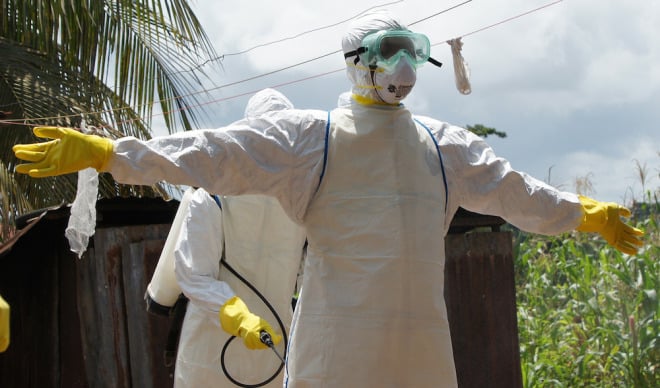
The European Commission’s DG ECHO team (CC), on Flickr
It may have skipped your notice, but the United States is now Ebola-free. Dr. Craig Spencer was released from treatment in New York City Tuesday; that day also marked the end of the watch period for Kaci Hickox, the nurse force-quarantined in New Jersey and then allowed to go home to a remote town on the Maine border. The two nurses who treated deceased patient Thomas Duncan, Amber Vinson and Nina Pham, were both released from treatment two weeks ago. The health care workers who were sickened in Africa and came home for treatment have all gone home.
There are some things to note in these events. The first is that the Ebolanoia over the possibility of the disease spreading in the United States is now clearly shown to have been an over-reaction. No one got sick because Spencer went around New York City in the days before he developed symptoms. No one got sick, either, from contact with Kaci Hickox — and, an important point, she never developed symptoms herself. Her quarantine was self-evidently unnecessary. The only people to have contracted Ebola in the United States are the two nurses who were in close face-to-face contact with Duncan when he was floridly ill, and while the hospital that treated him, and the Centers for Disease Control and Prevention, were working out the best protective protocols.
So we really could calm down now. (Have you noticed how the chatter has died down? Especially since the election?) But we also shouldn’t forget that Ebola continues in West Africa, and could return to the US at any time.
Here’s an example of the continuing challenges: the West African country of Mali.
According to the World Health Organization, Mali had one case of Ebola: a 2-year-old girl who was brought across the border from Guinea by her grandmother. The girl died Oct. 24, and the story behind her coming to Mali exemplifies how complex controlling Ebola has been in Africa.
Her father and grandfather were health care workers; the grandfather owned a private clinic, and the father worked there and for the Red Cross. On Sept. 12, a farmer from a nearby village died at the clinic. His two daughters had come with him to the clinic; they died there too. The toddler’s father cared for those people, and fell ill, and died himself on Oct. 3. The deaths were never analyzed, but authorities assume the visitors died of Ebola.
At the time, though, the toddler’s father was assumed by villagers to be under a witchcraft curse, and he was encouraged or forced to return to their home village 70 kilometers away, by bus. While he was traveling, his mother, the child’s grandmother, fell ill and died in the town where the clinic was; then his two brothers fell ill, and were sent to an Ebola care hospital run by Doctors Without Borders. One died there, and his father, the clinic owner and head of the family, died shortly afterward at a different treatment center.
Then the toddler began showing symptoms. With the family coming apart, the deceased patriarch’s second wife took the girl across the border to Mali to get care for her, taking taxis and overnight buses. Eventually they reached a hospital, where the girl died. Malian authorities tracked down 108 people who had some contact with her during the trip. None have become ill; some have exited the 21-day observation period, and others are coming close.
It looked like the country’s experience with the disease had ended — until just a few days ago. Yesterday, the WHO announced that two new cases have been found — and like the little girl, they occurred in a complex web of family illness, cross-border travel, and insufficient health care.
The first new case was a 70-year-old man, an imam, who fell ill in Guinea but was taken to a clinic across the Malian border by family members as he grew more sick. He died Oct. 27, ostensibly of kidney failure, and his body was taken home for funeral rituals and burial. In his home village, his first wife and daughter died; his brother, son and second wife all fell ill. Meanwhile, at the clinic, a nurse who had treated him died Nov. 11. Twenty-eight health care workers at the clinic in Mali, and a cluster of villagers and other family across the border in Guinea, are all now believed to have been exposed, and are being watched. (The New York Times reported last night that one of the health care workers, a doctor, has developed Ebola symptoms.)
When I read these stories, the first thing that strikes me in them is the complex, unfolding tragedy of entire communities coming to pieces. But the second is that the course of the disease through West Africa is hard to predict, and hard to track. We should be prepared for Ebola to leave Africa again. It would be good if we panicked less, next time.